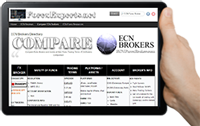 Choosing ECN Forex Brokers (3-Step Analysis)
Choosing ECN Forex Brokers (3-Step Analysis)
Online Forex trading has grown significantly over the past decade. As demand for currency brokerage services continues to rise, new Forex firms—mainly white labels—are emerging. This increased competition benefits traders by improving service quality and lowering trading costs. However, this does not mean every Forex broker is trustworthy. Many Forex scams exist that traders need to avoid.
Here is a three-step analysis to help you choose the ideal Forex broker.
👤 STEP-1: Defining your Trading Profile
Defining your trading profile is essential for choosing the right Forex partner. In step one, you should answer questions such as:
(1) How many hours can I dedicate to trading daily?
If you can trade many hours per day, consider a day-trading style like news trading or scalping. If you have only a few hours per week, look for swing or long-term styles, such as macro trading or carry trading.
(2) How much risk can I handle comfortably?
If you prefer low risk, choose long-term styles like carry trading and use low leverage (1:1 up to 10:1). For medium risk, swing trading with medium leverage (10:1 up to 30:1) is suitable. High-risk tolerance fits day-trading styles.
(3) What are my annual return goals?
It’s advisable to align your expectations with your risk tolerance. For example, if you accept low risk (10-20%), you shouldn’t expect annual returns above 40%.
♞ STEP-2: Selecting a Trading Strategy
After completing step one, you now know your trading profile (Day Trader, Swing Trader, or Long-Term Trader). In step two, you need to find a trading strategy that fits your profile. Two questions must be answered:
A. Which trading strategy best suits my profile?
B. What do I need to implement this strategy effectively?
Here are some popular trading strategies:
1 Scalping Forex (Day-Trade, using Expert Advisors)
2 News-Trading (Day-Trade, trading the Daily Calendar)
3 Arbitrageur (Day-Trade, using sophisticated software)
4 Swing-Trader (Trading mid-term trending or ranging markets)
5 Macro Trader (Trading the new Macroeconomic conditions)
6 Carry Trader (Trading the interest rates differential)
7 Long-Term Trader (Trading Long-Term Trends)
💼 STEP-3: Choosing the Right Forex Broker
The right Forex broker is determined by the requirements of each trading style (step 2). Some features are essential for every style, such as fund safety, while others vary. Here are key points to consider when choosing a Forex broker:
3.1 Safety of Funds – Regulation and Funds Segregation
- Importance: Great
- Required by: All trading styles
Always choose regulated Forex companies. Regardless of promises, an unregulated broker should be avoided. Look for regulation by reliable bodies like FCA UK, ASIC, or FINMA. A good ECN broker also provides full client fund segregation, meaning client funds are kept separate from corporate funds.
3.2 Safety of Funds – Capitalization / Years in the Market
- Importance: Great
- Required by: All trading styles
Choose well-capitalized brokers with a solid market presence. Brokers with capital issues pose risks. Check capitalization details on regulators’ websites. Also consider the broker’s years in the market and headquarters location—avoid new brokers and those based in offshore jurisdictions.
3.3 Account Types / Options
- Importance: Great
- Required by: All trading styles
Account types vary in parameters like lot size. Beginners need micro-lot accounts, while experienced traders prefer standard lots. Some accounts offer Real ECN, which usually requires a $1,000 minimum deposit.
Funding methods must suit you—if deposits can’t be withdrawn by the same method or fees apply, reconsider. Also, confirm if scalping and automated trading are allowed, which are essential for day traders.
3.4 Asset Index
- Importance: Medium to Great
- Required by: Mainly swing and long-term traders
Day traders focus on low-spread majors like EURUSD, USDJPY, USDCHF, and GBPUSD, which all brokers offer. Swing and long-term traders need a broader asset index, including Forex crosses and exotic pairs.
3.5 Trading Cost
- Importance: Great
- Required by: Day traders are sensitive to spreads; long-term traders focus on rollovers
Trading costs greatly impact success. Day traders (scalpers, etc.) must check spreads and commissions on the specific account type. These conditions vary by account. Rollovers (swap rates) matter mainly for swing and long-term traders.
3.6 Trading Platforms
- Importance: Medium to Great
- Required by: Mainly day traders
Many platforms exist. Beginners usually prefer easy web platforms. MetaTrader 4 (MT4) is the industry standard, offering chart trading, Expert Advisors, back-testing, and numerous indicators. About 85% of retail traders use MT4, which almost all ECN brokers offer. Some brokers use their own platforms and offer MT4 via software bridges. Demo accounts help test platform performance before funding.
3.7 Available Technology
- Importance: Medium to Great
- Required by: Mainly day traders
Good technology is critical for online trading. A solid ECN broker offers low slippage, no re-quotes, and no delays—especially important for day trading.
3.8 Customer Service
- Importance: Medium
- Required by: All trading styles
Customer service quality reflects how brokers treat clients. Professional brokers offer responsive support via phone, email, and live chat, available at least 24/5. Responses should come within 30 minutes by email. Having a personal account manager adds convenience.
3.9 Additional Services
- Importance: Low
- Required by: Mainly day traders
Extras may include daily trading signals, free education, SMS alerts, extended charting tools, and more.
3.10 Trading Promotions
- Importance: Medium
- Required by: Mainly day traders
Rebates benefit high-volume traders like scalpers and news traders. You can find free rebate plans at Forex-Rebates.com.
🎯 Conclusions -Tailoring Solutions to Individual Needs
Different trading styles require various factors to be considered when choosing a Forex broker. Day trading, in particular, demands more complex setups. Here is a summary of the key requirements for day trading and longer-term trading styles:
(i) Needed by all trading styles:
-
Safety of money / Regulation
-
Suitable account types (ECN, lot size)
-
Suitable funding methods
-
Responsive customer service
(ii) Needed by day-trading styles:
-
Low trading costs (tight spreads)
-
Suitable trading platforms
-
Fast and reliable technology (low slippage, no re-quotes)
-
Allowance for scalping and automated trading
-
Available promotions (trading rebates, contests, free VPS, etc.)
(iii) Needed by swing and long-term trading styles:
-
Cost of trading (rollovers)
-
Wide asset index
-
No maintenance or inactivity fees
■ Choosing ECN Forex Brokers -3-Step Analysis
ForexExperts.net
🔗 COMPARE BROKERS
» DIRECTORY
» TRADE SPREADS
» FOREX SCALPING
» FUNDS SAFETY
» SWAP RATES









